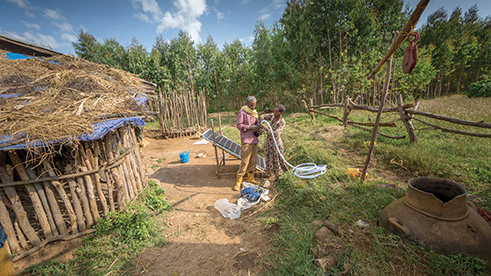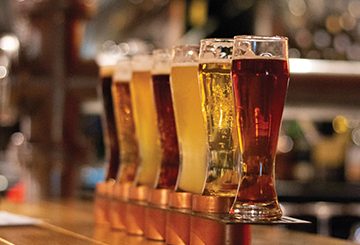Working toward Water and Food Security in Times Good and Bad

by Molly Nance and Jesse Starita, Daugherty Water for Food Global Institute
For years, the Daugherty Water for Food Global Institute at the University of Nebraska has worked toward one goal: a water and food secure world. While we have yet to achieve the audacious vision shared by Bob Daugherty and others who are passionate about solving this complex challenge, we have made important and measurable progress.
Water and food security have become an even more important global priority due to the COVID-19 pandemic – a health crisis that has affected many aspects of our daily lives. This includes extreme stress on our agriculture, food and water systems. Farmers, ranchers and dairy producers, many still recovering from massive floods, droughts or severe weather, are now dealing with lost markets and further market turmoil. As with any global crisis, the most adversely affected are the poorest and most vulnerable segments of the population, including refugees, the displaced, and those in conflict areas.
While our staff, faculty and students worked remotely for most of 2020, we have been collaborating intensely—pushing research to develop innovative tools and technology, as well as new business models and practices that can help us overcome COVID-19’s impact on agriculture and the environment. As just one example, Dr. Jesse Bell, our new director of water, climate and health; and professor of health and environment at the University of Nebraska Medical Center’s College of Public Health, led a research team to develop a specialized COVID-19 data map of Nebraska, which now includes statistics and resources for four surrounding states. In addition to showing the number of current COVID-19 cases, the map also includes comprehensive data and resources for first responders.
We were very pleased to welcome Dr. Bell to the leadership team, thanks to a generous gift from UNMC alumna Anne Hubbard, MD, to create a new program at the University of Nebraska to address some of Nebraska’s most pressing public health issues associated with climate and water. The Water, Climate and Health program will be based in UNMC’s College of Public Health and bring together experts from UNL’s Institute of Agriculture and Natural Resources and the Daugherty Water for Food Global Institute (DWFI) to conduct research and disseminate information on environmental issues related to climate, water and health.
As with other organizations planning international events, we had to cancel the 2020 Water for Food Global Conference. But we quickly pivoted to the virtual world with a series of webinars around conference themes. For example, we partnered with other organizations to host a two-part series on “Accelerating Inclusive Farmer-led Irrigation” which attracted over 400 attendees from more than 100 countries. This and several other webinars are available on DWFI’s YouTube Channel at youtube.com/waterforfood.
We have continued progress on a number of international projects, including irrigation research for the government of Kazakhstan; further development of a drought monitoring tool and soil moisture monitoring in the MENA region; expansion of research using flux towers to measure soil conditions with the Irrigation Innovation Consortium; and, review and analyses of irrigation business models for smallholder farmers in Rwanda, which will scale to include more countries with a recent $1 million grant from the International Fund for Agricultural Development.
Our work in Nebraska has also expanded and matured. A prime example is the Ogallala Water Coordinated Agriculture Project (OWCAP), led by a multi-state team including the Nebraska Water Center (NWC), which is part of DWFI. Since its inception in 2016, this USDA NIFA-funded effort has brought together producers, scientists, groundwater managers, students, and public and private organizations into a coherent project that supports research and encourages greater visibility and adoption of practical approaches to help extend the productive life of the Ogallala Aquifer.
In late 2019, we shared testimony with our legislature in support of a budget appropriation to augment our water research in Nebraska. Nebraska’s water resources support our $25 billion agricultural economy, sustain wildlife and the environment, and, of course, provide what we need for healthy daily living. Improving how we manage water can make a tremendous difference in Nebraska’s economy and the quality of life for our citizens – a fact recognized when Governor Ricketts signed Nebraska’s 2021 state budget bill last August, which included $500,000 designated annually to the institute for water research in the state.
Educating and cultivating future leaders and researchers in water management and agriculture is an important focus area that supports our mission. Since the beginning, DWFI has provided funding to faculty for student-led research that explores innovative solutions to water and food security. Many of our students have graduated to pursue doctoral programs, or entrepreneurial start-ups, or have joined prestigious organizations and agencies that are shaping the future of water management. In total, the institute has awarded $1.9 million to more than 60 University of Nebraska undergraduate and graduate students.
Our communications team has worked hard this past year to share these accomplishments. Our website—waterforfood.nebraska.edu—features multiple social media channels, news releases, videos, photos, a monthly newsletter and now a podcast featuring stories from people on the cutting-edge of water and agricultural innovation.
This was a challenging year for humanity. We hope Nebraskans and the global community have reconnected with life’s essentials – like water and food – and came away appreciating these necessities even more. The demands on these resources will only grow in the future. Through its strengths in research, education, policy and communications, the DWFI is well positioned to bring solutions to the table.




Recent Comments